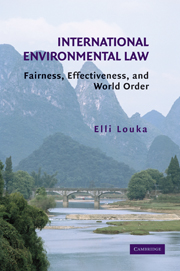Book contents
- Frontmatter
- Contents
- Foreword by W. Michael Reisman
- Abbreviations
- Introduction
- Chapter 1 Introduction to International Environmental Law
- Chapter 2 Foundations of International Environmental Law
- Chapter 3 Compliance and Governance Mechanisms
- Chapter 4 Marine Environment
- Chapter 5 Water Resources
- Chapter 6 Fisheries Resources
- Chapter 7 Biodiversity
- Chapter 8 Air Pollution
- Chapter 9 Trade and Environment
- Chapter 10 Hazardous and Radioactive Wastes
- Chapter 11 Liability and State Responsibility
- International Treaties and Other Instruments
- List of Cases
- Index
Chapter 6 - Fisheries Resources
Published online by Cambridge University Press: 14 January 2010
- Frontmatter
- Contents
- Foreword by W. Michael Reisman
- Abbreviations
- Introduction
- Chapter 1 Introduction to International Environmental Law
- Chapter 2 Foundations of International Environmental Law
- Chapter 3 Compliance and Governance Mechanisms
- Chapter 4 Marine Environment
- Chapter 5 Water Resources
- Chapter 6 Fisheries Resources
- Chapter 7 Biodiversity
- Chapter 8 Air Pollution
- Chapter 9 Trade and Environment
- Chapter 10 Hazardous and Radioactive Wastes
- Chapter 11 Liability and State Responsibility
- International Treaties and Other Instruments
- List of Cases
- Index
Summary
STATE OF WORLD FISHERIES
The state of world fisheries is considered under threat with reports forecasting the depletion or collapse of fisheries resources. The FAO has documented that of all major fisheries, 35 percent are subject to severe overfishing, 25 percent are fully exploited, and 40 percent present scope for further development. Furthermore, more than 90 percent of fish stocks are under national jurisdiction, and efforts at the national level are crucial for their protection.
In 2002, the FAO reported that, following a decline to 79.2 million tons in 1998, the total production of fisheries increased to 84.7 million tons in 1999. The production of fisheries increased further to 86 million tons in 2000, recovering to the historical maximum levels recorded in 1996 and 1997. According to the FAO, as fishing pressure increases, underexploited resources continue to decline, fully exploited fisheries remain relatively stable, and overexploited, depleted, or recovering stocks increase slightly. Catches from the northwest and southwest Atlantic have remained relatively stable for the last five to ten years. But the failure of cod, redfish, and haddock to rebound in the northwest Atlantic has been a source of concern. Most tuna stocks are fully exploited in all oceans and some are overfished or even depleted. The major cause for the depletion of fisheries has to do with the overcapacity of fishing fleets, which do not allow for the recovery of the resource.
In addition to fisheries, many marine species are claimed to be endangered.
- Type
- Chapter
- Information
- International Environmental LawFairness, Effectiveness, and World Order, pp. 244 - 287Publisher: Cambridge University PressPrint publication year: 2006



